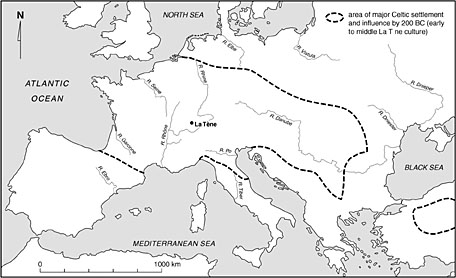

 | Page 286 |  |
the Alps—in northern france, Rhineland Germany, switzerland, and austria—were disrupted by the destructive power of an alliance between the Phoenician colonies of the western Mediterranean with the Etruscans and by the Persian occupation of eastern Greece and, for a brief period, of mainland Greece itself. Etruscan contacts developed in their place, because while Etruscan expansion into southern Italy was blocked by Greek settlements (or Magna Graecia), the Etruscans did consolidate their power in the region of the Po River in northern Italy.

Areas of Celtic Influence by 200 B.C.
In the first two decades of the fourth century b.c., three tribal groups named Galli, or Gauls (the Boii, Cenomani, and Insubres), and later the group known as the Senones invaded northern Italy from across the Alps. The Boii possibly originated from Bohemia while the others were most probably from northeastern France, where the district of Champagne showed signs of depopulation at this time. The sources for this movement of peoples include the Roman and Greek historians Livy (59 b.c.–a.d. 17), who was born in the Padua region of Italy, and Polybius (ca. 200–122 b.c.), who dated the arrival of the Gauls two centuries earlier.
The newcomers offered a serious threat to Etruscan power and settled in the Po Valley, where archaeological evidence of destruction and of new settlement in harmony with the indigenous population can be seen at such places as Bologna, Spina, and Monte Bibele. As Livy recounts, in 390 b.c., Rome was almost destroyed by the Gauls, who took six of its seven hills and nearly ended Roman power, which had flourished in the wake of the Etruscans’ defeat. A further six attacks were made on Rome between 367 and 320 b.c., and the Gauls later joined Hannibal’s troops to attack Rome in 218 b.c.
Further east in the Mediterranean, Celts were fighting as mercenaries in the Greek world from 369 b.c., when the Greek historian Xenophon (ca. 430–ca. 360 b.c.) records that Dionysius of Syracuse lent 200 Celts to aid the Spartans against his enemies in Thebes. Celts and the Celtic culture also spread east down the Danube River as far as Hungary, and Alexander the Great met and negotiated with Celts in 335 b.c., when they boasted that they feared nothing but that the heavens might fall on them. Their petition to settle in Greece having been denied, in 281 b.c. they killed the Macedonian king, Ptolemy Keraunos, and moved into Thrace.
 |  |